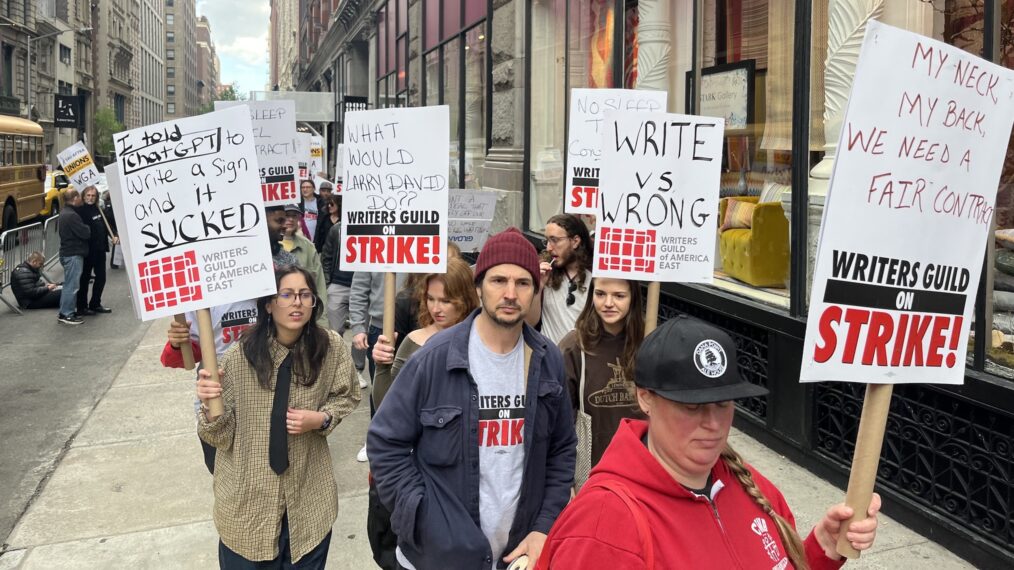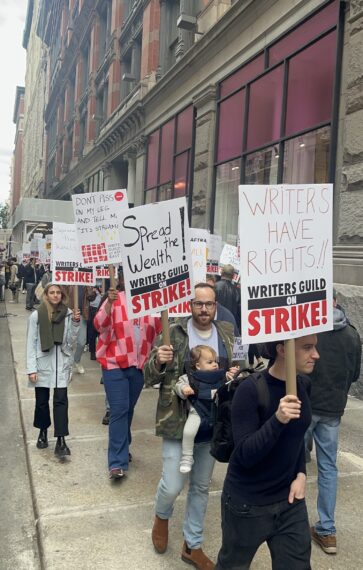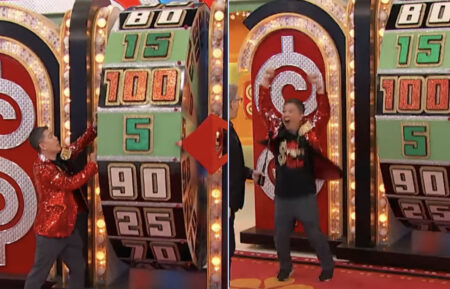WGA Writers Share Their Reasons for Strike Straight From Picket Lines

Exclusive
The Writers Guild of America is on strike, putting TV and film production on hold indefinitely.
From the outside looking in, it may not be clear why the thousands of members of WGA East and West are on picket lines this week. TV Insider went to the Wednesday, May 3 protest outside of Netflix’s New York City headquarters to get firsthand accounts from the writers of your favorite shows.
Here, they share their reasons for striking, explaining why this issue goes far beyond Hollywood.
Michael Winship, President of Writers Guild of America East
Winship was on the picket lines representing WGA East leadership. He explained why striking is necessary.
“Well, first of all, we love all of you, and we respect all of you, and we’re sorry if we’re disappointing you by not seeing the new shows and the regular shows you watch,” Winship told TV Insider. “The late-night shows went into reruns last light because of this, and I think you’ll soon see some of your favorite sitcoms and dramatic programs doing the same thing. The reason we’re doing this is in part because it’s not just us that they’re going to be coming after. It’s not just the entertainment companies that will be coming after us. It’s the entire problem with this attempt to turn the world into a gig economy, and we just can’t have that happen. It’s not good for you as an audience, it’s not good for us writers, and writers need to have a steady source of income and a regular source of income.
“All too often, what happened to the writers is that they work on a show for a few weeks, then not work again for another entire year, and then sometimes go through years where they don’t get to work on what they love to do. I know people think of us as being a sort of upper-class union, in terms of some of the salaries they read about. That only happens to a very few writers. Most of us, we’re middle-income people. We’re middle-class people. Our median income’s around, I don’t know, I think it’s $50 or $60,000. And a vast percentage of us, some 40 percent, are unemployed at any given time. So these are issues for us. What we’re trying to do is to get a fair contract where the gig economy is removed from the picture, where people are paid a fair and steady wage, and where things like artificial intelligence are not imposed upon us to basically stymie creativity.”
Winship said other unions supporting their cause has lifted spirits.
“The shows of solidarity have been amazing. I mean, if you look at this picket outside Netflix right now, we have people here from SAG-AFTRA, we have people here from IATSE, we have other people. The unions have been incredibly solid. SAG-AFTRA, IATSE, and the American Federation of Musicians were with us during the negotiation for part of the time,” he said. “I spoke with Randi Weingarten today, the president of the American Federation of Teachers, two million members, she says, ‘We’re with you, we’re behind you, we’ll be there on the line, we’ll do whatever you can.’ I talked to Liz Shuler, the head of the AFL-CIO, same thing. Just an incredible amount of support, because they can see that a lot of what we’re dealing with and facing, they may well be soon dealing with as well.”
“Honk if you support writers!” What #WritersStrike signs have caught your eye? #WritersGuildofAmerica pic.twitter.com/UkAIVj5piF
— TV Insider (@TVInsider) May 4, 2023
Greg Iwinski, Writers Guild of America East Council/Contract Negotiating Committee Member
Iwinski has written for The Late Show with Stephen Colbert, Last Week Tonight with John Oliver, and Game Theory with Bomani Jones. He went into how these structural issues have led to shows fans love being canceled inexplicably.
“There’s a lot of complex language about how things have changed and moved and production has changed, but at the end of the day, the big tech and what companies have done are making the shows worse,” he said. “The content’s worse. People like shows. Two seasons in, they get canceled. You don’t know why. There are no ratings. Everyone you know watches it, and it’s gone. You know [how] the way TV’s going is hurting writers, but [it’s] also hurting audiences. The ability to say, ‘Hey, we all watch. It has good ratings’ has been taken out of the system — the feedback of audiences, their ability to impact.”

Leah Williams/TV Insider
“I think we’re trying to get back to a place where artists have control and ownership of their material,” he continued. “And also, anyone who’s a millennial knows what this is. For us, we have to do a whole giant, systemic breakdown fight just to get what people before us had. That’s what this is for television and film. This is a bunch of people in their 30s being like, ‘If I ever want to pay rent, I have to tear a whole system down and build it up.’ And that’s what we’re gonna do.”
Iwinski then explained the power and importance of an in-person strike.
“Because so much protest now is done online, and that is important, but as a Black person that lives in New York and was here in 2020, real protest that is disruptive, that makes people stop and say, ‘What’s happening?’ that makes it harder for someone to walk into a building,” he said. “That makes a teamster turn a truck around. That stuff has a real, material impact, and it reminds people that we’re here. I think it also builds community, because you can sit at home and think, ‘Oh my gosh, what am I doing? We’re on strike.’ But when you’re here, it’s the realization that we are a community. We are a union that voted 98 percent to authorize a strike. Everyone here has something at stake, and we’re gonna fight for it together.”
“Anyone who’s millennial knows what this is, which is for us, we have to do a whole, giant, systemic, breakdown fight just to get what people before us had. And that’s what this is for television and film,” explains writer Greg Iwinski (@garyJackson) of the #WritersStrike pic.twitter.com/MlBf4dUHOu
— TV Insider (@TVInsider) May 4, 2023
He echoes Winship’s sentiment about union solidarity.
“I mean, 2007/2008 [the time of the last WGA writers strike], I was only watching TV as a fan, but this is absolutely new,” Iwinski said. The solidarity “from SAG, from the teamsters, from other unions, the flight attendants union, the pilots union, every part of organized labor realizing that this is a labor moment and realizing that we are all in this together” is amazing, he added, saying people recognize they “are organizing and taking on the same type of companies that people in a Starbucks are taking on, that people in an Amazon warehouse are taking on, that people at Hearst were taking on, that we are all fighting against the same destruction of labor.”
—Reporting by Leah Williams







